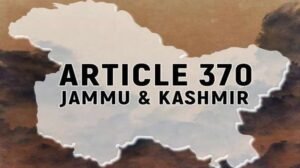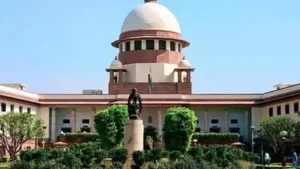The highly anticipated judgement on the abrogation of Article 370 is set to be delivered by the Honourable Supreme Court on December 11. This ruling is expected to significantly impact the country’s political and social landscape, as Article 370 has granted special status to the state of Jammu and Kashmir for many decades. All eyes are on the Supreme Court as the nation awaits the outcome of this historic decision.
Chief Justice D.Y Chandrachud will directe the constitution bench along with five justices, BK Gavavi, Sanjay Kishan Kaul, Surya Kant and Sanjiv Khanna has restrain the legal judgement on September 5, 2023, as of the bifurcation of Jammu and Kashmir into two union territories.

About the Abrogation of Article 370:
In 2019, the Central government made a controversial move by repelling Article 370 from Jammu and Kashmir. Also, bifurcating J&K into two UTs and Ladakh into another UT.
Article 370 was executed for the Presidential Rule, i.e., Article 356 on the state. After this, the deployment of security forces, restrictions on the internet and several activities were held. This triggered serious legal issues and created controversies all over the country.
The petitioner argued against the relationship of India with Jammu and Kashmir, which got foiled in the constitution, highlighting that Article 368, about the Parliament’s power to amend the constitution, was not applied to Article 370, which is now raising concern for the Union government.
In the early days, the Maharaja of J&K didn’t come forward to become an integral part of India. Therefore, the laws related to foreign affairs, defence and communication, and the Union lay in the IoA (Instrument of Accession) with this the internal sovereignty legislative power, and other matters remained in the hands of Maharaja.

The Central government with the respondents argued and highlighted that the abrogation of Article 370 had resolved the state’s security, and reshaped the state with normality, cutting down the issue of discrimination. Furthermore, J&K was converted into a Union Territory because of sharing sensitive borders on a ‘temporary’ basis.
Therefore, coming to the modification in Article 367 (India would not make laws applicable for J&K, except for communication, foreign affairs and defence). The govt modified Article 367 as it could have affected Article 370. If the changes were not made, then Article 370 could never be modified.
Moreover, an intense debate during the Winter Session in Parliament, while the passing of two amendment bills of J&K, the Home Minister Amit Shah criticised the former Prime Minister Pandit Nehru, calling it a ‘historic blunder’.
“He admitted they could not have taken the issue to the UN”, said Shah during the session.
The Home Minister also slammed Congress for the emigration of Kashmiri Pandits as if the government didn’t focus on the Vote Bank.












Comments 3